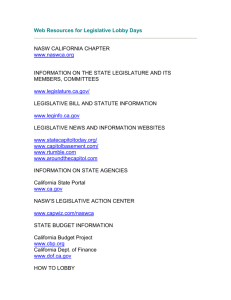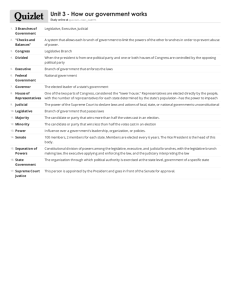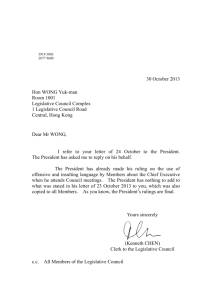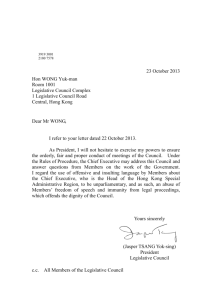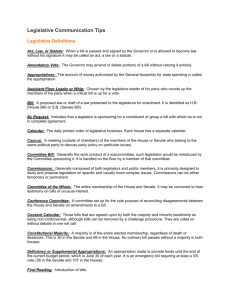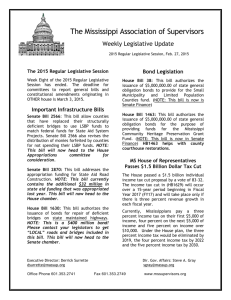Legislative Glossary - West Virginia Legislature
advertisement
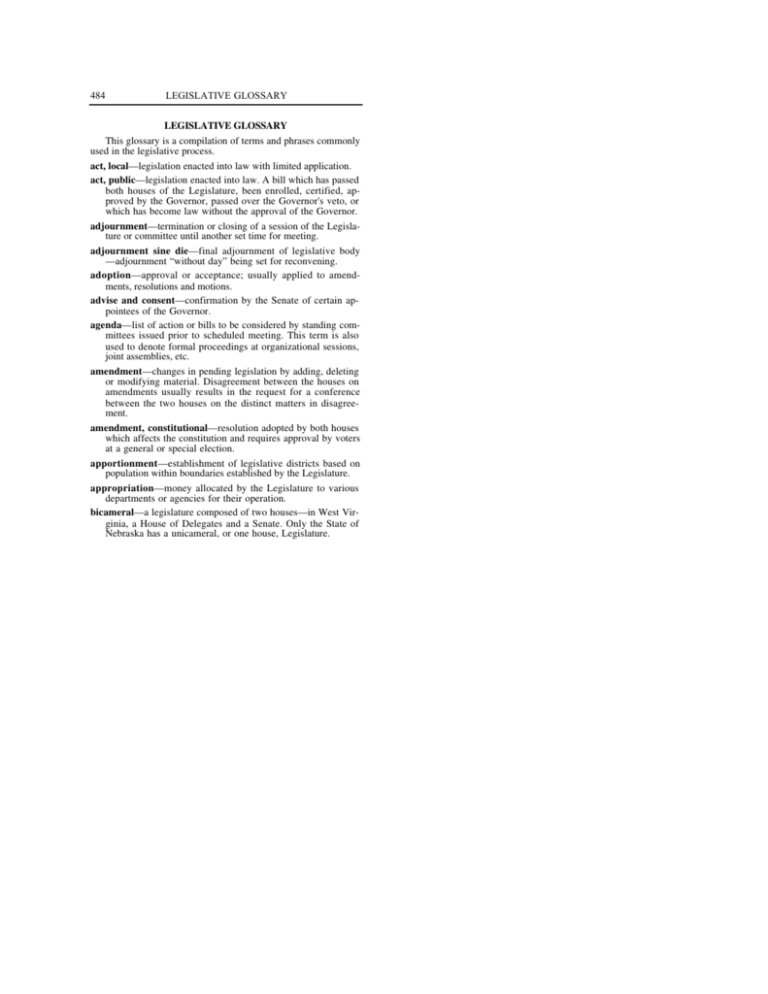
484 LEGISLATIVE GLOSSARY LEGISLATIVE GLOSSARY This glossary is a compilation of terms and phrases commonly used in the legislative process. act, local—legislation enacted into law with limited application. act, public—legislation enacted into law. A bill which has passed both houses of the Legislature, been enrolled, certified, approved by the Governor, passed over the Governor's veto, or which has become law without the approval of the Governor. adjournment—termination or closing of a session of the Legislature or committee until another set time for meeting. adjournment sine die—final adjournment of legislative body —adjournment “without day” being set for reconvening. adoption—approval or acceptance; usually applied to amendments, resolutions and motions. advise and consent—confirmation by the Senate of certain appointees of the Governor. agenda—list of action or bills to be considered by standing committees issued prior to scheduled meeting. This term is also used to denote formal proceedings at organizational sessions, joint assemblies, etc. amendment—changes in pending legislation by adding, deleting or modifying material. Disagreement between the houses on amendments usually results in the request for a conference between the two houses on the distinct matters in disagreement. amendment, constitutional—resolution adopted by both houses which affects the constitution and requires approval by voters at a general or special election. apportionment—establishment of legislative districts based on population within boundaries established by the Legislature. appropriation—money allocated by the Legislature to various departments or agencies for their operation. bicameral—a legislature composed of two houses—in West Virginia, a House of Delegates and a Senate. Only the State of Nebraska has a unicameral, or one house, Legislature. LEGISLATIVE GLOSSARY 485 bill—a proposal for the enactment of a new law, the amendment or repeal of an existing one, or appropriation of public money. The only vehicle for enactment of a law is the Legislature. Bills may originate in the House or Senate. Appropriation bills must be passed on a roll call vote by both bodies to become law. Ordinary bills may be passed either by voice vote or by a roll call vote if demanded by any member. If the Governor vetoes a measure, the Senate and House may override his decision as provided by the Constitution of West Virginia. Any bill which shall not be returned by the Governor within five days, Sundays excepted, after it shall have been presented to him shall be a law, in the same manner as if he had signed it, unless the Legislature shall by adjournment sine die, prevent its return, in which case it shall be filed with his objections in the office of the Secretary of State within fifteen days, Sundays excepted, after such adjournment, or become a law. Appropriation bills must be acted upon by the Governor within five days following adjournment sine die or become a law without his signature. calendar—listing of bills and resolutions reported out of committees and ready for floor action. caucus—an informal meeting of a group of members—usually of same political party—to discuss policy or legislation. chair—presiding officer of the Legislature—may be member, Speaker, President or committee chairman. chamber—the area reserved for members and staff for conducting legislative sessions—also called “floor”. clerk—chief administrative and parliamentary officer of the House or Senate elected by their respective members. The Clerk is the custodian of the official records, is charged with keeping the Journal and supervises the clerical business of the house. committees: conference—a committee made up of Delegates appointed by Speaker and Senators appointed by President to try to resolve differences in legislative measures. A majority of the conferees of each house is required to approve a compromise of matters in disagreement before submitting a report to the 486 LEGISLATIVE GLOSSARY entire membership of each house for final approval. Conference reports may not be amended, must be acted upon as a whole and are limited to actual matters in disagreement. discharge of —action taken by legislative body to force a bill or resolution out of committee and to floor for consideration. interim—established by law or rules to work between sessions. joint—committee composed of members of both houses. of the whole—informal session of entire membership of House or Senate acting as one committee—presided over by chairman appointed by Speaker or President. reports and recommendations—committee reports and recommendations are advisory only and do not become an act of the body until and unless ratified by the body. select—appointed by Speaker or President to handle specific matters and usually dissolved when purpose accomplished. standing—members appointed by Speaker and President at beginning of Legislature—have continuing responsibility in a general field of legislative activity—name reflects area of jurisdiction, i.e., Education, Health. subcommittee—small committee appointed by standing committee chair to research and study bill or problem and to report findings to entire committee. concurrence—action of one house agreeing to or approving proposal or action by the other body. conference—after the stage of disagreement has been reached, a motion to ask for a conference may be made by the house refusing to recede from its amendments to a measure. constituent—a citizen residing within the district of a legislator. convene—to assemble—the meeting of the Legislature daily or at the beginning of the session as provided by the Constitution. debate—discussion of a matter according to parliamentary rules. decorum—proper conduct of legislator as set forth in House and Senate rules. LEGISLATIVE GLOSSARY 487 dilatory—deliberate use of parliamentary procedure to delay. division—a method of voting in which only the numerical result is recorded. division of question —procedure to separate a matter to be voted upon into two or more questions. A motion to strike out and insert may not be divided. do pass —the affirmative recommendation made by a committee in sending a bill to the floor for additional action; “do pass, as amended” indicates committee recommends certain changes in bill. enacting clause—that clause of a bill or of an act which formally expresses the legislative sanction. It varies in different states but usually begins “Be it enacted”. engrossed bill—version of bill which includes all adopted amendments of house of origin attached to original measure. enrolled bill—final official version of bill as agreed to by both houses, containing all necessary signatures. first reading—reading of bill for information. gallery—balcony of House or Senate chamber from which visitors may view proceedings of Legislature. germaneness—the relevance or appropriateness of amendments or substitutes. hearing—public meeting of a legislative committee for the purpose of taking testimony concerning pending legislation. hopper rule—the rule which controls the introduction of bills and resolutions. indefinite postponement —a form of final adverse disposition of a proposal for that session of the Legislature. A question which has been postponed indefinitely may not again be acted upon during the session. initiative—act of permitting the people to submit issues to the Legislature or by way of constitutional amendments (presently not permitted in West Virginia except in certain municipalities). 488 LEGISLATIVE GLOSSARY interim committee —legislative committee authorized by the Legislature to study a particular subject between sessions. introduction of legislation —bills may be introduced during first forty-five days of a regular session in the House and the forty-first day in the Senate. No House or Senate bill or joint resolution, other than a supplemental appropriation or a bill originating in committee, may be introduced thereafter unless permission be given by a resolution, setting out the title to the bill, and adopted by a two thirds vote of the members present and voting. Jefferson’s Manual—the parliamentary authority which governs the parliamentary practices of the West Virginia Legislature in instances where the standing rules are silent or inexplicit. The Manual was prepared by Thomas Jefferson for his own guidance as President of the United States Senate from 1797 to 1801. The Manual is regarded by English paliamentarians as the best statement of what the law of Parliament was at the time Jefferson wrote it. journal—official chronological record of each house—contains roll call votes, attendance records, committee assignments, daily record of events, but not a verbatim transcript. lay on the table —postponement of a matter, which may later be brought up for consideration by a motion to “take from the table”. Neither motion is debatable. lay over—postponement of consideration of legislative measure. Legislature—in West Virginia, the House of Delegates is composed of one hundred members elected from fifty-eight delegate districts for a two-year term. The Senate is composed of thirty-four members elected from seventeen senatorial districts for a four-year term. lobbyist—a person who seeks directly or indirectly to encourage the passage, defeat or modification of any legislation. majority—the number of members in House and Senate generally necessary to pass legislation, etc.; also a group of legislators usually of the same political party who have the greatest number of elected members and who control top leadership positions. LEGISLATIVE GLOSSARY 489 minority—group of legislators usually of the same political party which numbers the fewest members. motion—a proposal made to the presiding officer calling for specific action. The principal tool used in the transaction of legislative business. Motions are of various order, rank, precedence and class as established through parliamentary practice and rules. motion, main —a formal proposal that the assembly take certain action. The consideration of a bill is a main motion. Consideration of an amendment to that bill is a subsidiary or secondary motion. Consideration of a bill may be postponed but consideration of an amendment to that bill cannot be deferred to another day if the body is to continue its deliberations on the bill. The reason is that the body in the meantime well may dispose of the main question. parliamentary inquiry—a question regarding procedure, directed to the chair. parliamentary law—recognized rules, precedents and usages of legislative bodies by which their procedure is regulated. point of order—question raised by a member when he doubts the correctness of a procedure being followed. Such a point requires a ruling from the presiding officer, is not debatable and is subject to appeal to the house in which the point of order is raised. point of personal privilege—a statement defending the rights, reputation or conduct of a legislator in his or her official capacity. postpone indefinitely—a form of final adverse disposition of a proposal for that session of the Legislature. A question which has been postponed indefinitely may not again be acted upon during the session. postpone to a day certain—to deter consideration to a definite later time or day. precedent—an authoritative example. When in a deliberative body a certain mode of procedure has been adopted in any case, it becomes a precedent for its government in every case thereafter of a similar character. 490 LEGISLATIVE GLOSSARY President—presiding officer of the Senate elected by Senate members. previous question (motion for)—a motion for the previous question halts debate, and moves the body to an immediate vote on the issue under consideration. Requires a majority present for adoption and is not debatable. Clerk's note: This motion has nothing to do with the last question considered by the assembly. Its present-day use has grown out of a long history of changing purpose, having been first used in the English Parliament in 1604. qualifications of members of Legislature—must be a citizen of the United States, a resident for one year within the district from which he or she is elected and as a member of the Senate, a person must be twenty-five years of age. quorum—a majority of the membership elected to the House or Senate necessary to conduct business. readings—constitutional presentation of a bill before either house. The reading of bills is required by the Constitution and by parliamentary law and practice to give public notice as to the proposed enactment. Every bill must be read three times in each house and only once per day. The rule may be suspended to permit a bill to be read more than once on the same day by a vote of four fifths of the members present. recall—act of permitting the voters to demand the removal of public officials (presently not permitted in West Virginia except in certain municipalities). recess—intermission in daily session or committee meeting. reconsider—a motion to retake a vote which places the question in the same status it was prior to the vote on the question. Uniquely a motion of American origin, it may be offered only within a limited time and by any legislator who previously voted on the prevailing side. Generally, the making of the motion has a higher rank than its consideration. Does not apply to motions to adjourn, to lay on the table, to take from the table or for the previous question. referendum—act of referring important legislative enactments to the public for approval (presently not permitted in West LEGISLATIVE GLOSSARY 491 Virginia except in certain municipalities or by specific legislative enactment). report out—return measure from committee to Clerk’s desk with or without recommendation as to further action. required votes: adopt amendment—majority of the members present. If yeas and nays are demanded, the demand must be sustained by ten members. an appeal from the decision of the chair—when demanded by any ten (10) members—majority present. motion for previous question—must be sustained by ten (10) members. Adoption of motion requires a majority present. override veto of Governor— ordinary bills—majority affirmative vote of all members elected. appropriation bills—two thirds of all members elected. passage of bill by house of origin which has been amended in other house—majority vote of all members elected in house of origin, to be determined by yeas and nays. resolutions proposing amendment to State Constitution —two thirds of all the members elected. suspend rules— two thirds of the members present, unless by unanimous consent. to dispense with constitutional rule requiring a bill to be read on three several days —requires a four-fifths vote by yeas and nays of all members present. to make a bill effective from passage—or at some time other than ninety days from passage, requires a two thirds vote taken by yeas and nays of all members elected—67 in the House and 23 in the Senate. yea and nay vote—may be demanded by one tenth of members present. resolution—measure used by single house to take action affecting its own procedure or expressing an opinion, sympathy, commendation, etc. 492 LEGISLATIVE GLOSSARY concurrent—measure affecting actions or procedures of both houses. joint—measure used to propose amendment to State Constitution or to ratify amendment to Federal Constitution. Action by both houses is required and they are treated in the same manner as bills except that they are not submitted to the Governor. Proposals to amend the State Constitution require a vote of two thirds of all members elected. To ratify an amendment to the Federal Constitution requires a vote of a majority present. roll call —recorded vote as opposed to viva voce or voice vote. Certain measures require a roll call vote. All roll call votes are entered upon the Journal. rules—the set of regulations and parliamentary procedures adopted separately by the House and Senate. There are also joint rules. second reading —reading of bill or joint resolution by reading clerk at a regularly scheduled session, usually having already been acted upon by a standing committee. The measure may be amended on the floor at this time. sine die—final adjournment of a legislative body. Literally, adjournment “without day” being set for reconvening. Speaker—presiding officer of the House of Delegates elected by House members. special order —matter of business set for a special time and day designated. sponsor—legislator or legislative committee introducing measure. Name appears on printed measure. strike out (motion to) —used in amendments to bills and resolutions in order to delete unwanted language—a motion to strike out the enacting clause has the effect of killing a bill. substitute—a substitute bill replaces the original measure and is designated as, for example, Com. Sub. for H. B. 10. A substitute bill is considered as the original. suspend the rules—a motion which temporarily suspends the normal rules of procedure to accommodate the handling of a particular measure. Only that matter for which suspension took LEGISLATIVE GLOSSARY 493 place can be considered. Requires approval by two thirds of the members present. Unless by unanimous consent, a roll call vote is required. third reading—reading of bill or joint resolution by reading clerk at a regularly scheduled session for passage by either house. title—a concise statement of the contents of a bill. title, short—an abridged description of a bill. unanimous consent —permission granted, without objection, by either house to a member desiring to accomplish a measure without making a motion. unfinished business—business which has been laid over from a previous day. veto—the action of the Governor in disapproving a legislative measure. voice vote —oral expression of the members when a question is submitted for their determination. Response is given by “ayes” and “nays” and the presiding officer states his decision as to which side prevailed. Technically termed viva voce. Vote, division and rising—to vote by a show of hands or by standing. Numerical results only are recorded in division and rising votes. withdraw a motion—a request to retract from further consideration a motion already offered. Requires majority approval but usually accomplished via unanimous consent. yeas and nays—recorded vote of members on an issue.
